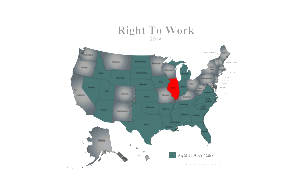Will Team Biden Weaponize Workers’ Pensions?
Big Labor abuse of worker pension and benefit funds as a means of advancing union bosses’ self-aggrandizing policy objectives is a familiar phenomenon.
 Illinois would be a Right to Work State if Scott Reeder’s high school speech had been better attended, well maybe that is a slight stretch. However, 31 years ago young Reeder spoke out against the anti-worker policy of compulsory unionism in his hometown an Illinois industrial city called Galesburg.
Illinois would be a Right to Work State if Scott Reeder’s high school speech had been better attended, well maybe that is a slight stretch. However, 31 years ago young Reeder spoke out against the anti-worker policy of compulsory unionism in his hometown an Illinois industrial city called Galesburg.
Had Illinois embraced Mr. Reeder’s call for freedom, his hometown might be a place of hope and optimism for the future rather than landscaped with abandoned buildings.
Is Reeder’s recent op-ed going to help ignite the fire of freedom in Illinois?
Reeder: So my speech calling for ending compulsory unionism was not particularly well-received. To them, I was preaching apostasy.
Today, when I visit my hometown, I feel sadness. Those union factory jobs have evaporated.
Galesburg is hardly unique.
The last time I wrote on this topic, union leaders responded by saying things are much worse in right-to-work states.
Baloney.
Take a look at our neighbors in Iowa and Indiana. Both states are right-to-work states, but the economies there are chugging along quite nicely.
Just consider these statistics compiled by the Illinois Policy Institute:
- A net of roughly 5 million Americans moved from the non-right-to-work states to right-to-work states from 2000 to 2010. That’s an average of about one person every minute.
- Right-to-work states experienced population growth of 15.3 percent, while population growth in non-right-to-work states was 5.9 percent between 2000 and 2010.
- 28.5 percent of Americans lived in right-to-work states in 1970; by 2008, that percentage rose to nearly 40 percent (to over 121 million).
Even Michigan, once the cradle of organized labor, has adopted a right-to-work law.
By contrast, Illinois has clung to an outdated model of compulsory unionism.
The fact of the matter is that many people who belong to unions would rather not be members. They are given little choice but to keep seeing a portion of their paychecks going to union bosses.

Big Labor abuse of worker pension and benefit funds as a means of advancing union bosses’ self-aggrandizing policy objectives is a familiar phenomenon.

What impact does handing a union monopoly power to deal with your employer on matters concerning your pay, benefits, and work rules have on your pay?

Wherever Big Labor wields the power to collect forced union dues, union bosses funnel a large share of the confiscated money into efforts to elect and reelect business-bashing politicians. Employment growth tends to lag as a consequence.